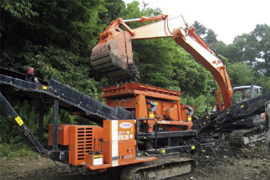The Mitsui & Co. Environment Fund
Introduction to Grant Projects
INDEX="267"
NAME="Creation of Earthquake Proof Artificial Ground Based on the Reuse of Waste Timber and Sludge Generated by the Great East Japan Earthquake"
TYPE="活動助成,"
YEAR="2011年度,"
AREA="日本全国,東北,"
KIND="大学,"
ORG="Graduate School of Environmental Sciences, Tohoku University"
Graduate School of Environmental Sciences, Tohoku University
Creation of Earthquake Proof Artificial Ground Based on the Reuse of Waste Timber and Sludge Generated by the Great East Japan Earthquake
Activity grant
- Project Description
Using Fiber Cement Stabilized Soil Method know-how that is a resource recovery method for high moisture content sludge previously developed by the applicant, to generate highly earthquake proof ground materials recycling waste wood and sludge generated in the affected regions, and carry out disaster recovery activities through the creation of earthquake proof artificial ground.
- Grant year
- FY2011 Activity Grants
- Grant term
- 1 year and 3 months
July 2011 - September 2012
- Grant amount
- 6,700,000 yen
- Activity region
- Miyagi Prefecture, Japan

Overview of the Organization

- Representative
- Professor Hiroshi Takahashi, Deputy Head of Research
- Established
- 2003
- Establishment purpose
- The School aims to resolve environmental issues from the region through a global scale, and create a sustainable society, and by conducting education and research related to theories that support society, nature and technology, and those methods, and will further develop human resources with deeper specialties and international qualities.
- Main areas of activity
- Mainly Miyagi Prefecture and the Tohoku region, however, the research target, such as field tests, is not just Japan, but also extends overseas.
- Staff
- 60 full-time employees
- Annual operating budget
- 12,976 million yen in 2008, 73,773 million yen in 2009, 108, 239 million yen in 2010.
- WEB site
- http://www.kankyo.tohoku.ac.jp
- Collaborating researchers and organizations
- Bon Terrain Method Research Association, Keiji Mashiko, Research Association Chairman, Masato Mori, Secretary General
- Recent activities
-
- Education of students in academic phase of doctoral program
- Education of students in thesis phase of doctoral program
- e-Learning based education for the general public
- Cutting edge research related to environmental science
- English-based education for students from overseas
- Regional collaboration-driven social contribution
- International Exchange activities
- Dissemination of information regarding research results through open lectures, and by giving back to society.